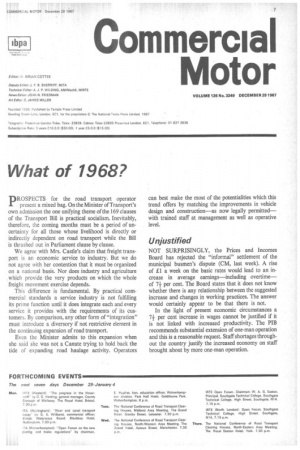What of 1968?
Page 9

If you've noticed an error in this article please click here to report it so we can fix it.
PROSPECTS for the road transport operator present a mixed bag. On the Minister of Transport's own admission the one unifying theme of the 169 clauses of the Transport Bill is practical socialism. Inevitably, therefore, the coming months must be a period of uncertainty for all those whose livelihood is directly or indirectly dependent on road transport while the Bill is thrashed out in Parliament clause by clause.
We agree with Mrs. Castle's claim that freight transport is an economic service to industry. But we do not agree with her contention that it must be organized on a national basis. Nor does industry and agriculture which provide the very products on which the whole freight movement exercise depends.
This difference is fundamental. By practical commercial standards a service industry is not fulfilling its prime function until it does integrate each and every service it provides with the requirements of its customers. By comparison, any other form of "integration" must introduce a diversory if not restrictive element in the continuing expansion of road transport.
Even the Minister admits to this expansion when she said she was not a Canute trying to hold back the tide of expanding road haulage activity. Operators can best make the most of the potentialities which this trend offers by matching the improvements in vehicle design and construction—as now legally permitted— with trained staff at management as well as operative level.
Unjustified
NOT SURPRISINGLY, the Prices and Incomes Board has rejected the "informal" settlement of the municipal busmen's dispute (CM, last week). A rise of /1 a week on the basic rates would lead to an increase in average earnings—including overtime— of 71 per cent. The Board states that it does not know whether there is any relationship between the suggested increase and changes in working practices. The answer would certainly appear to be that there is not.
In the light of present economic circumstances a 7+ per cent increase in wages cannot be justified if it is not linked with increased productivity. The PIB recommends substantial extension of one-man operation and this is a reasonable request. Staff shortages throughout the country justify the increased economy on staff brought about by more one-man operation.












































































